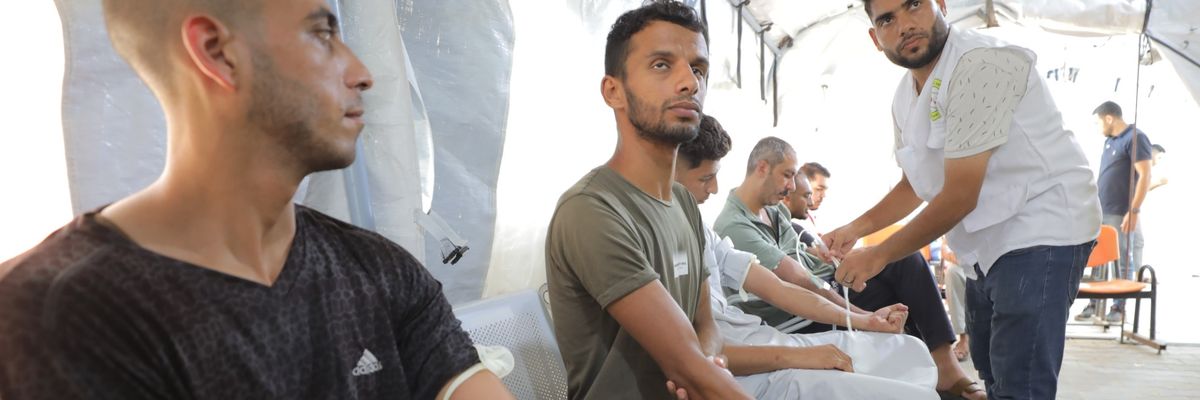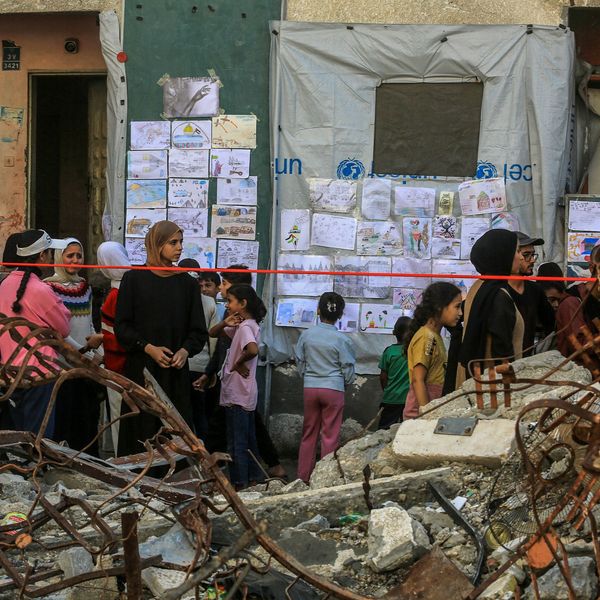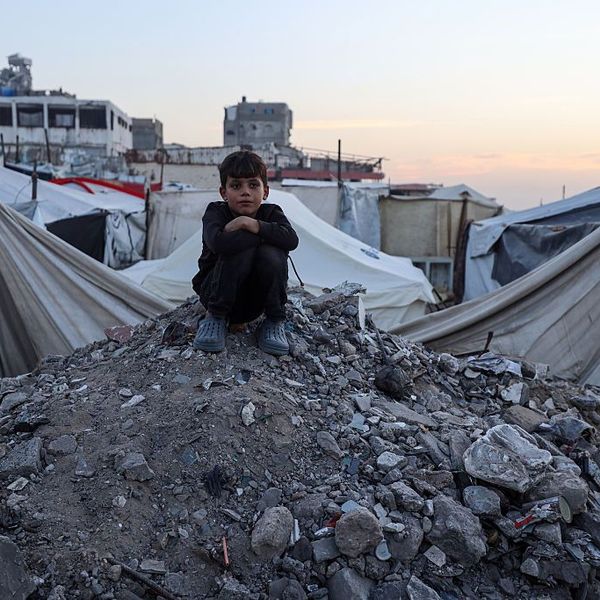
Palestinians wait to donate blood at Al-Awda Hospital in northern Gaza on July 26, 2024.
After 300 Days of Israeli Assault, Many Gazans Too Malnourished to Donate Blood
"It's truly admirable that despite these dreadful circumstances people are still wanting to help one another and support hospital staff by donating blood—even if, devastatingly, they are far too sick themselves to be able to do so."
As Palestinians and humanitarians around the world marked 300 days of horror in Gaza, an aid organization highlighted a pernicious consequence of Israel's nearly 10-month assault: A hospital in the northern part of the enclave was forced to turn away many who arrived to give blood to help those wounded by bombs and bullets because the potential donors themselves were too malnourished and sick.
Gazans turned out in significant numbers in recent weeks to give blood at Al-Awda Hospital, an already underresourced facility that faced an influx of wounded patients following the Israeli military's latest attacks on Gaza City.
ActionAid International, a global humanitarian group, said Friday that "despite facing appalling personal circumstances, many people selflessly responded to Al-Awda Hospital's call-out for blood donations, but with the whole of Gaza at high risk of famine, many were deemed too unwell to undergo the process."
Dr. Mohammed Salha, the acting director of Al-Awda, said a "large percentage" of potential blood donors were turned away because they were "suffering from malnutrition." An estimated 96% of Gaza's population is facing crisis-level hunger.
"Malnutrition is widespread, specifically in the northern Gaza Strip," said Salha. "For over five months, no vegetables, fruit, or meat have been brought into the northern Gaza Strip."
Al-Awda is one of the few hospitals in Gaza that is still partially functioning amid Israel's devastating military assault, which has killed nearly 40,000 Palestinians since October and sparked an unprecedented humanitarian emergency.
No one has been spared: Entire families, journalists, aid workers, nurses and doctors, and U.N. staff have been killed by the U.S.-armed Israeli military, and those who have survived have been repeatedly displaced and forced to live amid rotting trash, sewage, and the ruins of homes and buildings with little to no access to clean water, reliable food sources, bathrooms, and other necessities.
The fetid conditions have become what the World Health Organization described as a "perfect breeding ground for disease." Earlier this week, Gaza's Health Ministry declared the enclave a "polio epidemic zone" and warned the consequences could spill over into neighboring countries.
Lice, scabies, and rashes are also rampant in the enclave given overcrowded conditions. Israel's forced evacuations of large swaths of Gaza have meant that more than two million people have sought refuge in just 14% of the territory.
"In addition to the spread of many skin diseases... there are thousands of [people who] have come to the hospital here and the hospitals operating in the northern Gaza Strip [who are] suffering from viral hepatitis," said Salha.
"The world must not normalize the horrors we are witnessing in Gaza."
Riham Jafari, advocacy and communications coordinator at ActionAid Palestine, said Friday that "it's no surprise at all that diseases and infections are running rampant in Gaza when people have been forced to live in such appalling and dehumanizing conditions, and have barely anything to eat."
"It's truly admirable that despite these dreadful circumstances people are still wanting to help one another and support hospital staff by donating blood—even if, devastatingly, they are far too sick themselves to be able to do so," Jafari added.
As conditions on the ground in Gaza worsen by the hour, the prospects of a cease-fire agreement appear increasingly remote amid Israel's fresh assassination campaign, which analysts argue is a clear attempt by Israeli Prime Minister Benjamin Netanyahu to sabotage truce negotiations.
U.S. President Joe Biden, who has approved more than 100 arms sales to Israel since the October 7 Hamas-led attack, said Thursday after speaking with Netanyahu that "we have the basis for a cease-fire."
Netanyahu, the president added, "should move on it." But Biden gave no indication that he intends to pressure Israel by cutting off the weapons supply to its forces, who have used American arms to commit horrific war crimes.
Rohan Talbot, director of advocacy and campaigns with the U.K.-based group Medical Aid for Palestinians, said Thursday that "the world must not normalize the horrors we are witnessing in Gaza."
"Governments, including the U.K. government, must immediately cease arms transfers to Israel and redouble efforts to secure a permanent cease-fire," Talbot added. "Any delay will be measured not in days, but in Palestinian lives."
An Urgent Message From Our Co-Founder
Dear Common Dreams reader, The U.S. is on a fast track to authoritarianism like nothing I've ever seen. Meanwhile, corporate news outlets are utterly capitulating to Trump, twisting their coverage to avoid drawing his ire while lining up to stuff cash in his pockets. That's why I believe that Common Dreams is doing the best and most consequential reporting that we've ever done. Our small but mighty team is a progressive reporting powerhouse, covering the news every day that the corporate media never will. Our mission has always been simple: To inform. To inspire. And to ignite change for the common good. Now here's the key piece that I want all our readers to understand: None of this would be possible without your financial support. That's not just some fundraising cliche. It's the absolute and literal truth. We don't accept corporate advertising and never will. We don't have a paywall because we don't think people should be blocked from critical news based on their ability to pay. Everything we do is funded by the donations of readers like you. Will you donate now to help power the nonprofit, independent reporting of Common Dreams? Thank you for being a vital member of our community. Together, we can keep independent journalism alive when it’s needed most. - Craig Brown, Co-founder |
As Palestinians and humanitarians around the world marked 300 days of horror in Gaza, an aid organization highlighted a pernicious consequence of Israel's nearly 10-month assault: A hospital in the northern part of the enclave was forced to turn away many who arrived to give blood to help those wounded by bombs and bullets because the potential donors themselves were too malnourished and sick.
Gazans turned out in significant numbers in recent weeks to give blood at Al-Awda Hospital, an already underresourced facility that faced an influx of wounded patients following the Israeli military's latest attacks on Gaza City.
ActionAid International, a global humanitarian group, said Friday that "despite facing appalling personal circumstances, many people selflessly responded to Al-Awda Hospital's call-out for blood donations, but with the whole of Gaza at high risk of famine, many were deemed too unwell to undergo the process."
Dr. Mohammed Salha, the acting director of Al-Awda, said a "large percentage" of potential blood donors were turned away because they were "suffering from malnutrition." An estimated 96% of Gaza's population is facing crisis-level hunger.
"Malnutrition is widespread, specifically in the northern Gaza Strip," said Salha. "For over five months, no vegetables, fruit, or meat have been brought into the northern Gaza Strip."
Al-Awda is one of the few hospitals in Gaza that is still partially functioning amid Israel's devastating military assault, which has killed nearly 40,000 Palestinians since October and sparked an unprecedented humanitarian emergency.
No one has been spared: Entire families, journalists, aid workers, nurses and doctors, and U.N. staff have been killed by the U.S.-armed Israeli military, and those who have survived have been repeatedly displaced and forced to live amid rotting trash, sewage, and the ruins of homes and buildings with little to no access to clean water, reliable food sources, bathrooms, and other necessities.
The fetid conditions have become what the World Health Organization described as a "perfect breeding ground for disease." Earlier this week, Gaza's Health Ministry declared the enclave a "polio epidemic zone" and warned the consequences could spill over into neighboring countries.
Lice, scabies, and rashes are also rampant in the enclave given overcrowded conditions. Israel's forced evacuations of large swaths of Gaza have meant that more than two million people have sought refuge in just 14% of the territory.
"In addition to the spread of many skin diseases... there are thousands of [people who] have come to the hospital here and the hospitals operating in the northern Gaza Strip [who are] suffering from viral hepatitis," said Salha.
"The world must not normalize the horrors we are witnessing in Gaza."
Riham Jafari, advocacy and communications coordinator at ActionAid Palestine, said Friday that "it's no surprise at all that diseases and infections are running rampant in Gaza when people have been forced to live in such appalling and dehumanizing conditions, and have barely anything to eat."
"It's truly admirable that despite these dreadful circumstances people are still wanting to help one another and support hospital staff by donating blood—even if, devastatingly, they are far too sick themselves to be able to do so," Jafari added.
As conditions on the ground in Gaza worsen by the hour, the prospects of a cease-fire agreement appear increasingly remote amid Israel's fresh assassination campaign, which analysts argue is a clear attempt by Israeli Prime Minister Benjamin Netanyahu to sabotage truce negotiations.
U.S. President Joe Biden, who has approved more than 100 arms sales to Israel since the October 7 Hamas-led attack, said Thursday after speaking with Netanyahu that "we have the basis for a cease-fire."
Netanyahu, the president added, "should move on it." But Biden gave no indication that he intends to pressure Israel by cutting off the weapons supply to its forces, who have used American arms to commit horrific war crimes.
Rohan Talbot, director of advocacy and campaigns with the U.K.-based group Medical Aid for Palestinians, said Thursday that "the world must not normalize the horrors we are witnessing in Gaza."
"Governments, including the U.K. government, must immediately cease arms transfers to Israel and redouble efforts to secure a permanent cease-fire," Talbot added. "Any delay will be measured not in days, but in Palestinian lives."
As Palestinians and humanitarians around the world marked 300 days of horror in Gaza, an aid organization highlighted a pernicious consequence of Israel's nearly 10-month assault: A hospital in the northern part of the enclave was forced to turn away many who arrived to give blood to help those wounded by bombs and bullets because the potential donors themselves were too malnourished and sick.
Gazans turned out in significant numbers in recent weeks to give blood at Al-Awda Hospital, an already underresourced facility that faced an influx of wounded patients following the Israeli military's latest attacks on Gaza City.
ActionAid International, a global humanitarian group, said Friday that "despite facing appalling personal circumstances, many people selflessly responded to Al-Awda Hospital's call-out for blood donations, but with the whole of Gaza at high risk of famine, many were deemed too unwell to undergo the process."
Dr. Mohammed Salha, the acting director of Al-Awda, said a "large percentage" of potential blood donors were turned away because they were "suffering from malnutrition." An estimated 96% of Gaza's population is facing crisis-level hunger.
"Malnutrition is widespread, specifically in the northern Gaza Strip," said Salha. "For over five months, no vegetables, fruit, or meat have been brought into the northern Gaza Strip."
Al-Awda is one of the few hospitals in Gaza that is still partially functioning amid Israel's devastating military assault, which has killed nearly 40,000 Palestinians since October and sparked an unprecedented humanitarian emergency.
No one has been spared: Entire families, journalists, aid workers, nurses and doctors, and U.N. staff have been killed by the U.S.-armed Israeli military, and those who have survived have been repeatedly displaced and forced to live amid rotting trash, sewage, and the ruins of homes and buildings with little to no access to clean water, reliable food sources, bathrooms, and other necessities.
The fetid conditions have become what the World Health Organization described as a "perfect breeding ground for disease." Earlier this week, Gaza's Health Ministry declared the enclave a "polio epidemic zone" and warned the consequences could spill over into neighboring countries.
Lice, scabies, and rashes are also rampant in the enclave given overcrowded conditions. Israel's forced evacuations of large swaths of Gaza have meant that more than two million people have sought refuge in just 14% of the territory.
"In addition to the spread of many skin diseases... there are thousands of [people who] have come to the hospital here and the hospitals operating in the northern Gaza Strip [who are] suffering from viral hepatitis," said Salha.
"The world must not normalize the horrors we are witnessing in Gaza."
Riham Jafari, advocacy and communications coordinator at ActionAid Palestine, said Friday that "it's no surprise at all that diseases and infections are running rampant in Gaza when people have been forced to live in such appalling and dehumanizing conditions, and have barely anything to eat."
"It's truly admirable that despite these dreadful circumstances people are still wanting to help one another and support hospital staff by donating blood—even if, devastatingly, they are far too sick themselves to be able to do so," Jafari added.
As conditions on the ground in Gaza worsen by the hour, the prospects of a cease-fire agreement appear increasingly remote amid Israel's fresh assassination campaign, which analysts argue is a clear attempt by Israeli Prime Minister Benjamin Netanyahu to sabotage truce negotiations.
U.S. President Joe Biden, who has approved more than 100 arms sales to Israel since the October 7 Hamas-led attack, said Thursday after speaking with Netanyahu that "we have the basis for a cease-fire."
Netanyahu, the president added, "should move on it." But Biden gave no indication that he intends to pressure Israel by cutting off the weapons supply to its forces, who have used American arms to commit horrific war crimes.
Rohan Talbot, director of advocacy and campaigns with the U.K.-based group Medical Aid for Palestinians, said Thursday that "the world must not normalize the horrors we are witnessing in Gaza."
"Governments, including the U.K. government, must immediately cease arms transfers to Israel and redouble efforts to secure a permanent cease-fire," Talbot added. "Any delay will be measured not in days, but in Palestinian lives."

